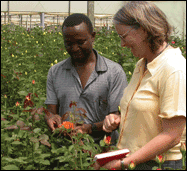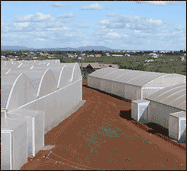
During April the judging panel met and decided on The World Challenge 12 finalists. These were the lucky finalists:
Click an image below to view project.
Here is one of the 12 finalists of the World Challenge competition 2005.


IPM stands for 'integrated pest management' - the use of natural predators to control pests. It's not a new technology. But biocontrol companies, which rear 'natural enemies' for sale to farmers, are not yet competitive with their chemical counterparts. Hence vast quantities of harmful chemical pesticides continue to be used throughout the world. To try to make the production of natural pests more cost-effective, husband and wife team Henry Wainwright and Louise Labuschange decided to set up Real IPM in Kenya, where the equatorial climate ensures a much faster rate of bug production. These savings are passed on to growers. Even small-scale farmers in poor countries can afford to introduce millions of bugs per hectare of land, as an effective control against such pests as the spider mite, leafminer and whitefly. To ensure best results, potential customers are obliged to pass an examination before they are permitted to make a purchase. As Real IPM admits, this is an unusual approach to business expansion! But it is an approach that they are confident will pay dividends in the long-run, since IPM failure is invariably the result of poor training and management. Real IPM has meant a real outlay for its founders who have put in their own savings. But to Louise making a profit from their company is a distant second to demonstrating by success that integrated pest management is a viable alternative to dousing Africa's fields and greenhouses with damaging chemicals that the bugs quickly develop a resistance to.
Bugs Money will appear on BBC World Saturday 24 September at 08:30 GMT, 13.30 GMT, 20:30 GMT.
The finalist advertorial will appear in the international Newsweek editions (EMEA, Asia, Latin America): On Sale 22 September























